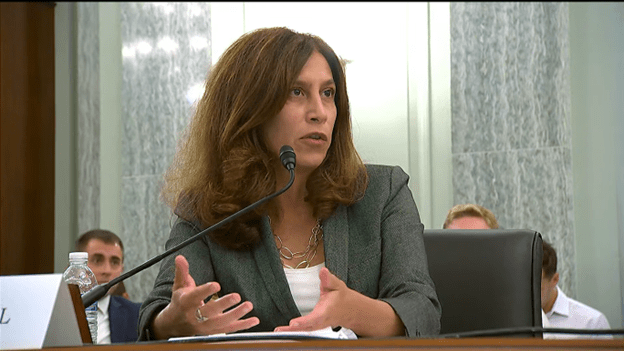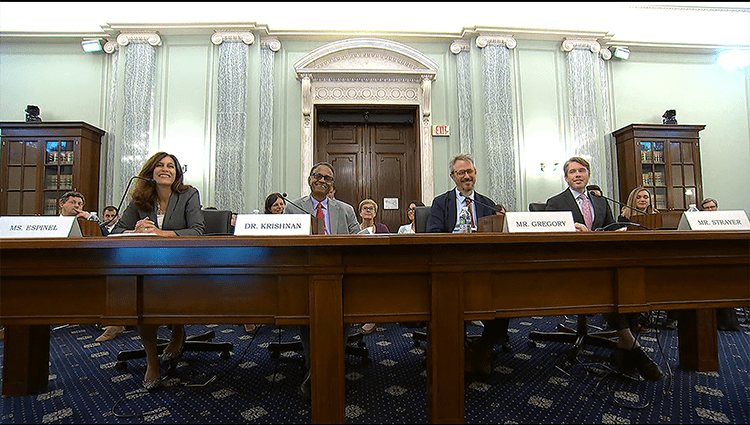
BSA | The Software Alliance CEO Victoria Espinel made the case for Congress to pursue artificial intelligence (AI) legislation that establishes clear obligations for both deployers and developers of AI during testimony before a key Senate Commerce subcommittee on Tuesday.
During a crucial stretch for AI policy in Washington this week, Espinel said that legislation would build trust in artificial intelligence and promote its broad adoption, and urged US lawmakers to act swiftly.
“So my message to Congress is simple: do not wait,” Espinel told members of the Senate Commerce Subcommittee on Consumer Protection, Product Safety and Data Security. “AI legislation can build on work by governmental organizations, industry, and civil society. These steps provide a collective basis for action. You can develop and pass AI legislation now that creates meaningful rules to reduce risks and promote innovation.”
Requiring companies developing and using AI in high-risk contexts to use impact assessments would help counter risks of bias and discrimination and ultimately promote the broad-based adoption of AI, she said.
“Those are very distinct roles and the developer and the deployer will know very different things about the AI system, both how it’s being developed and how it’s being used,” Espinel said in response to Sen. Todd Young (R-IN), one of the leading Republicans working toward AI legislation in the Senate, who inquired about the deployer-developer distinction. “As you’re thinking about legislation, clearly distinguishing between developers and deployers is critical in order for the legislation to be effective and workable.”
That distinction was a focus of lawmakers on Tuesday, as a number of senators asked about its importance during testimony Q&A.
Espinel also conveyed a sense of urgency to the senators who gathered for the hearing, which came a day before a marquee gathering of tech CEOs with the entire US Senate to consider next steps on AI policy. Among the available tools to lawmakers, Espinel said, included requiring the use of impact assessments for high-risk AI systems.
“It is our belief that in high-risk situations – for example, a government making a determination about access to public benefits – if there are consequential decision that impact a person’s rights, we believe that there should be legislation requiring impact assessments be done and those risks be mitigated,” Espinel said.
The hearing was organized by Sens. John Hickenlooper (D-CO) and Marsha Blackburn (R-TN), a bipartisan pair who had earlier this year had written a number of industry leaders including BSA about steps AI developers are taking to implement the Risk Management Framework (RMF) for artificial intelligence published by the National Institutes of Science and Technology (NIST) earlier this year. Blackburn put into focus during this hearing the need for US leadership on artificial intelligence policy amid work within the European Union to finalize the AI Act as soon as later this year.
“There’s a real opportunity right now to move towards a harmonized approach globally,” Espinel told Blackburn. “I think the United States has a very important role to play there in terms of moving a large number of countries to a harmonized approach … The United States is a leader in innovation, we should be a leader here as well.”

Other topics covered during the hearing included content authentication and deepfakes, transparency for when consumers are interacting with AI technology, and the need for a comprehensive federal privacy law – the importance of which Espinel underscored both during testimony and in written comments filed with the committee.
One additional area of focus involved how to promote use of the NIST AI RMF. Sen. Jerry Moran (R-KS), who had introduced legislation to require the use of the NIST AI RMF in federal procurement decisions, asked Espinel about its usefulness as a tool to counter AI risks.
“The NIST AI framework is flexible. It provides a roadmap for companies in terms of how they can put practices and policies in place to responsibly develop and use AI. We support it being used by the US government. We support it being used in the context of procurement,” she said.
The testimony represented a major opportunity for BSA to make the distinct enterprise software case for AI legislation at a time when policymakers globally are focused on both promoting and regulating this innovative technology. In advance of Tuesday’s hearing, Espinel published an opinion piece in Fortune emphasizing how the economies of countries that set thoughtful rules for AI stand to benefit the most from the technology.
Watch the full testimony below.

